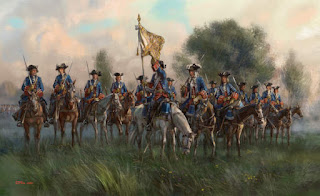The development of cavalry in Western Europe, 1562-170
In-depth look at cavalry and their use in battle from the late 16th to early 18th century
.
This is a great book. It tells in-depth the story of the development and evolution of cavalry during the era of the military revolution specifically from the end of the Italian Wars and finishes at the end of the wars of Louis XIV. It centres on France as this is the most influential nation during this period but developments in places like Britain, Poland and Sweden are considered.
The principal focus of the book is the cavalry charge and how this developed in the face of firearms (initially the arquebus and later the musket) being used by infantry and cavalry. Infantry in this era became dominant. The war of religion is studied in which lance-armed men at arms and Reiters were competing on the battlefield. The Thirty years war is next to be considered with developments from Sweden following on from Maurice of Nassau and his linear system. What is the concern of the author is things like the use of pistols, depth of formation and at what speed the cavalry are charging. It tells the story of many key battles of that era as a way of understanding the evolution of cavalry. Many military manuals of the time are also considered as a way of finding the theory of the time. The positioning of the cavalry is considered through out the period under review whether it was on the flanks as later it became the norm or interspersed with infantry as under Gustavus Adolphus. Also the equipment of cavalry are investigated with the emphasis on armour at the beginning of the period until later when there was none. Charles XIi was an exponent of aggressive cavalry tactics but did not have a succcessor. Cavalry under Turenne fought with skill. The huge battles of the War of Spanish Succession are covered. An era when decisive cavalry actions were often neutralised by infantry. A far cry from the start point he concludes that the stagnation would be broken eventually by Frederick the Great.
To conclude, an absorbing and inspiring read. Wargamers would find this useful especially anyone writing rules. A welcome addition.





















